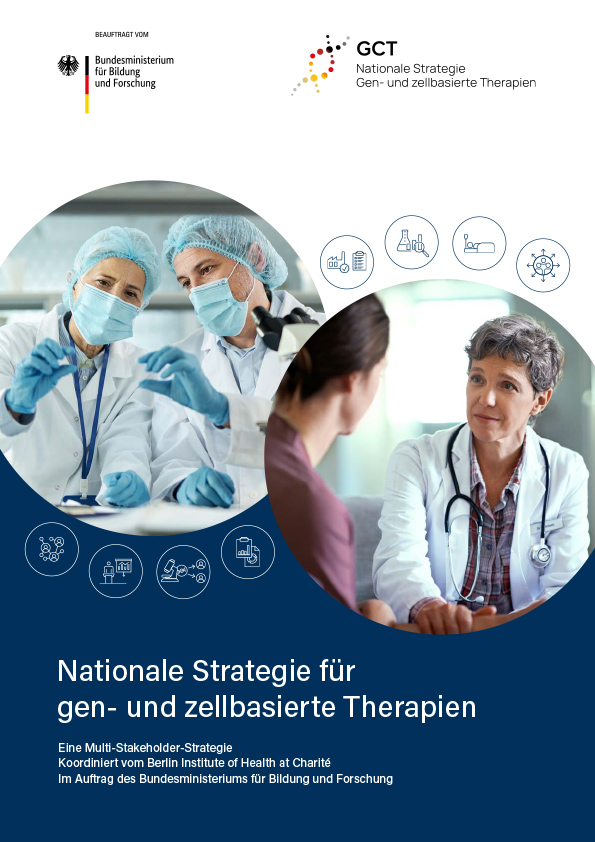National Strategy for Gene- and Cell-Based Therapies
Together, stakeholders from science, business, politics and society have developed a strategy paper to improve the translation of new research findings into medical care applications. The results were presented to Federal Minister of Education and Research, Bettina Stark-Watzinger, at the Futurium in Berlin on 12 June 2024.

Gene- and cell-based therapies (GCT) are key technologies for innovations in biomedical research and medical care. They offer promising approaches to the treatment of hitherto incurable illnesses. At the same time, much more research is needed to improve their efficiency and safety, as well as to ensure the comprehensive availability of these treatments. Although Germany has a leading role in both fundamental research and various technological developments, there are particular challenges in their implementation in healthcare and economic value creation. As a result, Germany might not be able to keep pace in this field, which, in turn, might impair patients’ healthcare. For this reason, around 150 experts from various stakeholder groups have developed a schedule for strengthening Germany’s position in the field of gene- and cell-based therapies on behalf of the German Federal Ministry of Education and Research. Fraunhofer IZI director, Prof. Dr Ulrike Köhl, PD. Dr Stephan Fricke (director of the Department of Cell and Gene Therapy) as well as Prof. Dr Michael Hudecek (director of the Department of Cellular Immunotherapy) have all collaborated on this project.
In recent years, cell and gene therapies have added numerous promising treatment options, in particular, in haematological oncology. As a result, a dynamic new field of research has evolved worldwide. At the same time, the growing number of clinical studies has raised hopes for an increase in the number of approved new gene- and cell-based treatments. However, this also leads to an increased demand for pharmaceutical production capacities – both at a small scale for clinical studies and for comprehensive commercial production. Ulrike Köhl, director of Fraunhofer Institute for Cell Therapy and Immunology (IZI), contributed her extensive expertise in the “Expansion of Quality and Capacity in GMP Production” working group.
“Ensuring sufficient production capacities for cell and gene therapeutics as well as their critical source materials is extremely important for Germany’s technological autonomy in this field. To consider all necessary aspects of value creation and efficiently use the limited resources the expansion of the necessary infrastructure should be coordinated across the different federal states and between the various stakeholders.”
Moreover, strong and consistent technology transfer is necessary to ensure the clinical application of novel cell and gene therapies resulting in their commercial use. Compared with its international competitors, Germany cannot keep pace as a research centre of excellence at the moment, however. Therefore, various measures are required to facilitate the necessary value creation in Germany and Europe, in addition to promoting excellent research results. Stephan Fricke, director of the Department of Cell and Gene Therapy at Fraunhofer IZI, was involved in the “Technology transfer” working group.
“The development of stable and scalable manufacturing processes according to GMP (Good Manufacturing Practice) is an essential step to safeguard the transfer of research results to clinical applications. The need for efficient technology transfer has to be considered early on in the development of novel cell and gene therapies. In turn, this requires the necessary expertise and a suitable infrastructure.”
The improvement of structural preconditions for translational research was defined as yet another strategic aim. This includes the establishment of a national network which promotes professional exchange while harmonising and improving organisational and regulatory aspects. Additionally, preconditions are to be created ensuring a changed mindset among researchers encouraging them to also become active entrepreneurs. After all, the stakeholders will have to become more willing to accept risks to ensure that both the expertise and the value chain remain in Germany. Michael Hudecek, director of the Department of Cellular Immunotherapy in Würzburg, was involved in the “Research and Development” working group.
“Decentralised hubs sharing their infrastructure with all stakeholders have to be created to further expand the core competences in the development and production of cell and gene therapies at the various national sites. The demand for gene- and cell-based therapies will increase. In turn, this means that capacities in Germany have to be expanded to ensure independence from manufacturers in other countries both in terms of time and in terms of finance.”